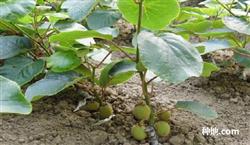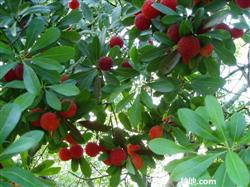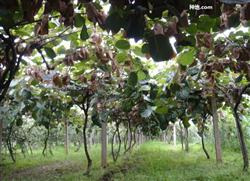How should kiwifruit seedlings be raised?

How should kiwifruit seedlings be raised? Please introduce kiwifruit seedlings: seed collection, select the fully ripe fruit of the strong mother tree, separate the seed and pulp after softening, wash and dry and set aside. Soak the shade-dried seeds in 45 ℃ warm water for one day and night 40 days before sowing. Pad the bottom of the flowerpot with wet sand (it is better to hold the water in your hand just enough to ooze), then spread the seeds flat, alternately layer sand and cover with linoleum. Sowing: sowing in the early spring of the following year, apply sufficient basic fertilizer before sowing, fertilize 4000 kg ~ 5000 kg per mu, irrigate enough water, and sow after the water seeps. As kiwifruit seeds are small, it is best to use fine-sifted nutritious soil for strip sowing. The row spacing is 15 cm, the sowing area is 20 cm, and the sowing rate is 1 g / m2. After sowing, cover 2mm ~ 3mm with sifted fine soil and cover with straw to keep the soil moist. Planting: uncover the grass in time after emergence. When the seedlings grow 3 true leaves, the seedlings are planted, the distance between the seedlings is 10 cm ~ 15 cm, and the rest of the seedlings can be transplanted with soil. Thin fertilizer should be applied frequently at the seedling stage. When the diameter of the seedling reaches 0.5 cm, grafting can be carried out. The best period of softwood cuttage is mid-June and mid-September. In addition, the growth peak of kiwifruit has passed, and it also avoids the high temperature in summer. Selection and treatment of cuttings: select annual semi-lignified branches without diseases and insect pests as cuttings, leaving 2 ~ 3 buds in each branch, 1 ~ 2 leaves in the upper part, and cut off half of the leaves left. The cut under the cutter should be close to the flat or oblique shear under the Internode, and the cut must be smooth, and then dipped in the cut with 2 × 10-4 ABT rooting powder No. 1 solution. Bed preparation and management cuttings should be selected in places with better water sources, use sifted sand as bed soil, and disinfect the soil with mansen zinc or potassium permanganate, and build a 2-meter-high shade after the land is leveled. Check at any time after insertion to keep the humidity in the shed at 90%, usually spraying water once in the morning and afternoon on a sunny day. It took root about 20 days after insertion, and 0.2% urea or potassium dihydrogen phosphate could be sprayed after 25 days for extra-root fertilization. The cuttings can be transplanted after 60 days. Root cutting and seedling raising: the root tillering ability of kiwifruit is strong, and the root segments dug up during soil preparation or seedling emergence are used to promote the germination of rootstock seedlings, thus saving a lot of seeds and branches. The method is to cut the thick root of the pencil into 10 cm ~ 15 cm root segments, cut the big head up and the small head down, and the small head should be cut flat by pruning, which can sprout and take root after cutting, and the survival rate of cutting in the first and middle of April is the highest. The preparation and post-cutting management of the cutter are the same as those of tender wood cuttings. Click to get more kiwifruit planting techniques click to get more fruit planting techniques
- Prev

How to cultivate big tree red bayberry
How to cultivate a big tree red bayberry? Please guide and introduce the big tree red bayberry is one of the special fruits in China. The yield of red bayberry is high, with a yield of 500 Mu and 1000 kg per mu, and the highest yield per plant can reach more than 200 kg. The maturing period of red bayberry is from mid-late May to early June, which is 20-30 days earlier than that of Zhejiang. The fruit is light at this time.
- Next

What do you need to pay attention to when growing kiwifruit?
What do you need to pay attention to when growing kiwifruit? Please guide the planting of kiwifruit need to pay attention to the following points: 1, pay attention to the selection of varieties. The new garden should choose new and excellent varieties according to the market trend. Shaanxi can develop varieties such as Heyward, Xixuan No.2 (Kiwi Fuhua), Yute, etc. 2. Pay attention to taking measures according to local conditions. Kiwifruit likes water and is afraid of waterlogging.
Related
- Moge, come on! The staff of the peasant association in the producing area of cantaloupe were frightened when the crowd gathered.
- Causes and Solutions of low Fruit setting rate of Apple
- Symptoms and control measures of passion fruit virus disease
- Fruit growing lesson: how do apple orchards keep high yields?
- Can you build orchards in the mountains? What are the pros and cons?
- How to manage the coloring period of Crisson grape?
- This paper introduces the processing technology of two kinds of fig products.
- How much is a month for retired teachers in rural areas by 2020?
- How can strawberry planting increase sugar content? We should pay attention to management in many aspects.
- What are the cultivation techniques on how to improve the yield of golden fruit?

